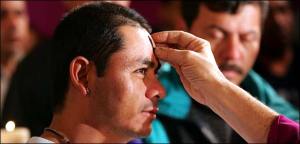In Parts 1 and 2 of this series, I examined and reacted to several sections of Jenny Hwang’s recent guest column in Christianity Today titled “Arizona’s Border Crisis“. Specifically, I focused on those issues raised and hypothetical scenarios given that could impact not only the illegal immigrants themselves but their families and the churches/organizations who minister to the needs — spiritual & otherwise — of the illegals and their families. In this third post, I wanted to say a bit more about the concerns raised and address the larger issue of the proper Christian response in these matters.
First, let’s return to the article — specifically, the very first paragraphs, which say:
In January, I ate at the home of an immigrant family in Phoenix in which the dad recently became a Christian because of the hardships he has endured while living in the U.S. The undocumented immigrant father has been attending church every week to draw closer to God because he lives in fear of being separated from his two young children, who are U.S. citizens. He feels torn about living in the United States illegally, but he also feels that God has called him to stay in the United States for a reason and struggles every day to reconcile those two feelings.
This man considered moving his family back to Mexico because life was so hard in Phoenix, but was concerned about his two young children who would go back to a country they never knew. They fed us generously with freshly made tortillas and pulled pork as the children ran around the yard, yelling at each other in a mix of Spanish and English, much like the children of any immigrant parents who grow up blessed by knowing two cultures.
During the same visit, my colleague met an undocumented immigrant woman named Maria whose son was killed by a drunk driver; she cannot press charges because of her undocumented status.”
The first thing one thinks is, “Oh, those poor souls. They are good people, just trying to make it through their already difficult lives. These terrible laws that make them hide their illegal — I mean, undocumented — status just add to the stress and threaten them and their families.”
Maybe the father left an even more dangerous or difficult situation back in Mexico, maybe not. Either way, he knew what he was getting into, or at least had a good idea, when he decided to cross the border illegally. So did Maria, who tragically lost her son. They knew the risks. They must, therefore, be prepared to deal with the difficulties of living where they are not supposed to be. Because they did not seek citizenship through legal channels, they do not get the benefits and privileges of living here as legal residents or naturalized citizens.
Of course, Ms. Hwang and others use these kinds of stories to pull at the heartstrings, stir the readers’ emotions, so that they are primed to “stand up for the oppressed” against those who would cause them pain. This is the rhetorical technique called “pathos”. Don’t let yourself be manipulated by it.
You may think I’m being cold, that I’m insensitive to the plight of many immigrants who flee to the U.S. for any number of reasons, but mostly to make a better life for themselves and their loved ones. But, I’m not. I understand it very well, and if I were in their shoes, I might decide to risk it, too. Nevertheless, if you do the crime, you should be willing to do the time, pay the fine, endure hardship on you & your loved ones, or some combination thereof. It’s the price you pay. We are all responsible for our actions.
 I think part of the difficulty some people have in taking this seriously is that the crime in question seems so harmless by itself. In fact, people take great risks and pay all they have (usually to “coyotes”, who smuggle them in and often demand more payment once here) to come over. They just want a better life, after all. But, there are good reasons for a sovereign state to want to monitor and limit those whom it lets in, especially for permanent residence and to partake of the freedoms and protections and other benefits in a democratic, free-market nation like the United States. Even if the immigrant in question is not guilty of past crimes, it seems to me that the first step in proving s/he is ready to assimilate and abide by the laws of the nation they want to become a part of is to follow the laws for getting in. (As my soon-to-be sister-in-law is doing.)
I think part of the difficulty some people have in taking this seriously is that the crime in question seems so harmless by itself. In fact, people take great risks and pay all they have (usually to “coyotes”, who smuggle them in and often demand more payment once here) to come over. They just want a better life, after all. But, there are good reasons for a sovereign state to want to monitor and limit those whom it lets in, especially for permanent residence and to partake of the freedoms and protections and other benefits in a democratic, free-market nation like the United States. Even if the immigrant in question is not guilty of past crimes, it seems to me that the first step in proving s/he is ready to assimilate and abide by the laws of the nation they want to become a part of is to follow the laws for getting in. (As my soon-to-be sister-in-law is doing.)
I understand the desire to help these people — i.e., those whose only crime was to cross the border without proper documentation. (I’m ignoring any minor violations of traffic safety or civic regulation, for now.) And, I especially understand the desire of churches who feel they have a duty to help those in need, etc. But, what if it was a different crime? What if the individuals in question were all guilty of theft? Or, fraud? Would you still feel obligated to help them avoid the authorities? Should a church help such individuals become integrated into the local community? (In fact, one could argue that illegal aliens living & working in the U.S. are guilty of fraud & theft, since they often obtain fake identities and take advantage of things like free healthcare and education, which are funded by taxpaying citizens.)
One might be tempted to bring up the biblical example of the Hebrew midwives who lied to Pharaoh about why they wouldn’t/couldn’t kill newborn Hebrew boys, because it served a higher purpose. Or, similarly, Corrie Ten Boom and her family hid Jews in their home and lied to the Nazis. In both cases, they were breaking the law in order to help the “oppressed”. But, these are not good analogies or valid excuses. Remember, the laws in question were by evil & corrupt rulers/governments and demanded that the babies/Jews be put to death (or, possibly, sent to horrible concentration camps, in the latter case).
Or, one might refer to New Testament instruction to love your neighbor, minister to others, etc. (Even to your enemy, to some degree.) Don’t these illegal immigrants qualify for this humane treatment? Shouldn’t good Christians help them out, too? Well, yes and no. It’s one thing to provide someone with a hot meal, treat wounds and/or sickness, maybe even give them a blanket or clothing. Those are immediate needs for basic survival. But, ongoing aid would be wrong. To my mind, it would be akin to aiding & abetting a fugitive. (Do churches get special privileges when it comes to giving aid & comfort? Something classified under “sanctuary” or some such thing? I don’t know.)
 Ultimately, I suppose, it’s a matter of conscience, but that conscience also needs to be properly informed and prepared to pay the penalty. If someone knowingly shelters illegal aliens in their basement, or transports them somewhere with the intent of helping them stay longer as undocumented residents in the U.S., for example, they have no right to cry foul if they get caught, fined, jailed, and/or their vehicle impounded. We are a nation of laws, and those laws must be heeded, whether you think they are stupid or unfair or whatever. For Christians, I think the N.T. makes it clear that we are to obey the laws of the land unless those laws require doing something clearly contrary to God’s moral laws. It would have to be pretty clear and pretty serious, and I don’t think helping illegal aliens to remain here illegally meets those conditions. The better course of action is to work within the system to improve the laws and make it easier for decent, hard-working people who want to become Americans (and not just take advantage of living here) to immigrate here legally.
Ultimately, I suppose, it’s a matter of conscience, but that conscience also needs to be properly informed and prepared to pay the penalty. If someone knowingly shelters illegal aliens in their basement, or transports them somewhere with the intent of helping them stay longer as undocumented residents in the U.S., for example, they have no right to cry foul if they get caught, fined, jailed, and/or their vehicle impounded. We are a nation of laws, and those laws must be heeded, whether you think they are stupid or unfair or whatever. For Christians, I think the N.T. makes it clear that we are to obey the laws of the land unless those laws require doing something clearly contrary to God’s moral laws. It would have to be pretty clear and pretty serious, and I don’t think helping illegal aliens to remain here illegally meets those conditions. The better course of action is to work within the system to improve the laws and make it easier for decent, hard-working people who want to become Americans (and not just take advantage of living here) to immigrate here legally.
Then, we can greet our new neighbors with open arms, open hearts, and open homes.
—–
Agree? Disagree? Think I’m an uncaring clod? Am I thwarting the Gospel? Care to add something I left out, or posit a different argument? All (civil) comments welcome…

